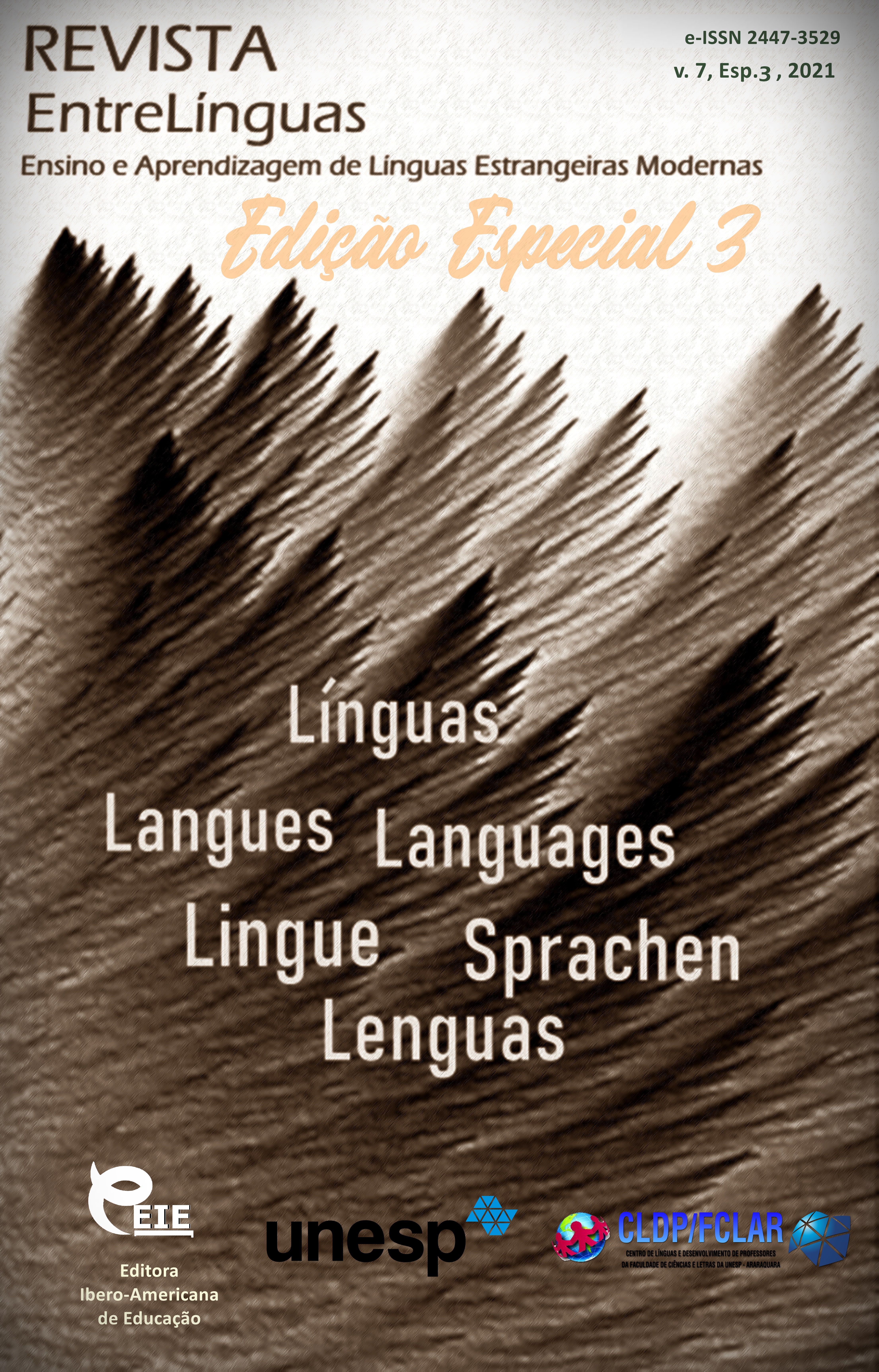Communicating culture through language (examples of russian adjectival phraseology)
DOI:
https://doi.org/10.29051/el.v7iesp.3.15698Keywords:
Phraseology, Idioms, Adjectival, Culture, Russian, CommunicationAbstract
In this paper, phraseological units are considered as the most valuable source of information about the culture and mentality of a people of a certain nation; they are often preserved in folklore, customs and traditions, and can be found in literature. In order to recognize a lexical unit as a concept, a keyword of culture is necessary, so it is commonly used, frequently included in phraseological units or proverbs, sayings, and so on. In this study, several phraseological units that reflect traditions and customs of English, Australian and Russian people are discussed. The main focus of the study was on adjectival phraseological units, which are those correlated with adjectives, with the purpose of revealing their meanings, based on various cultural and historical factors. Meanings can be communicated from a variety of positions and even different approaches from which a culture is considered. Phraseological Units enrich each language and are inextricably linked with the culture of the native speakers. More than 900 units of various structures in Russian were found, and then located in sentences from the Russian language corpus. For emphasizing the connection of the units with the culture in which they were formed, examples representing Russian cuisine, stereotypes, climate and others were selected for the article.
Downloads
References
ABDULLINA, L. R.; AGEEVA, A. V.; ARTAMONOVA, E. V. Corpus linguistics tools for loanwords and borrowings studies. Journal of Research in Applied Linguistics, v. 10, p. 33-41, 2019.
ANDREYEVA, Y. A.; KORNEVA, I. G.; SAKHIBULLINA, K. A. Values and anti-values in figurative phraseological units in the russian and german languages. Humanities & Social Sciences Reviews, v. 7, n.4, p. 427-432, 2019.
ARSENTIEVA, E. F. Phraseology and phraseography in a comparative aspect: (on the material of Russian and English languages). Kazan State University, 2006. 172 p.
DAL, V. I. The explanatory dictionary of the living great russian language. 4. ed. Saint Petersburg, 1914. v. 4, p. 9.
ECONOMAKIS, E. How different we are! Saint Petersburg: KARO, 2001. 224 p.
FEDOROV, A. I. Phraseological dictionary of the russian literary language. Moscow: AST, 2008. 828 p.
FROLOV, I. T. et al. Introduction to philosophy. Textbook for universities: in 2 parts. Moscow: Politizdat, 1989. 639 p.
HASELBACH, A. Learning in polylogues. Processes of social insertion into overlapping culture. Lifelong Learning in Europe, v. 5, n. 4, p. 196-200, 2000.
IONOVA, I. A. Adjectival phraseological units with a comparison structure in modern russian. Russian language at school. Prosvesheniye, 1975. n. 4, p. 96-101.
KUNIN, A. V. English-Russian phraseological dictionary, about 20,000 phraseol. 4. ed. Moscow: Rus. lang., 1984. 942 p.
KUNIN, A. V. Phraseology of modern English. The experience of a systematic description. Moscow: Intern. Relations, 1972. 288 p.
LUBENSKAYA, S. I. Russian-english phraseological dictionary. Moscow: Languages of Russian culture, 1997. 1056 p.
MAKSIMOV, S. V. Krylatye slova. Saint Petersburg, 1899. 261 p.
MASLOVA, V. A. Linguoculturology: a textbook for university students. Moscow: Publishing Center “Academy”, 2001. 208 p.
PIMENOVA, N. D. Comparative analysis of phraseological units with component-ornithorous in the english and turkish languages. Kazan, 2002. 22 p.
ROHRBACH, R.; WINIGER, E. Tandem statt unterricht [Tandem instead of teaching]. Comano, Switzerland: Universitat Bern, 2001. p. 64-68.
ROIZENZON, L. I. Notes on Russian comparative phraseology. Questions of phraseology, Samarkand, p. 12-21, 1971.
SOBOLEVA, N. P. Linguoculturological aspects of the contextual use of phraseological units in advertising slogans. Vestnik Tomskogo Gosudarstvennogo Universiteta, Filologiya, v. 45, p. 139-149, 2017.
TARASOV, E. F. Intercultural communication: a new ethnology of the analysis of language consciousness. Ethnocultural specificity of language consciousness. Moscow, 1996. 227 p.
TIKHONOV, A. N. Phraseological dictionary of the russian language. Moscow: Russian language-Media, 2007. 338 p.
WHITFORD, G. K.; DIXON, R. J. English-Russian vocabulary and phraseological dictionary. American idioms: 4500 units. Moscow: Zest, 1994. 190 p.
Published
How to Cite
Issue
Section
License

This work is licensed under a Creative Commons Attribution-NonCommercial-ShareAlike 4.0 International License.
Os manuscritos aceitos e publicados são de propriedade da Revista EntreLínguas. Os artigos publicados e as referências citadas na Revista EntreLínguas são de inteira responsabilidade de seus autores.
Transferência de direitos autorais – autorização para publicação
Caso o artigo submetido seja aprovado para publicação, já fica acordado que o(s) autor(es) autoriza(m) a UNESP a reproduzi-lo e publicá-lo na EntreLínguas, entendendo-se os termos “reprodução” e “publicação” conforme definição respectivamente dos incisos VI e I do artigo 5° da Lei 9610/98. O artigo poderá ser acessado pela rede mundial de computadores (Internet), sendo permitidas, a título gratuito, a consulta e a reprodução de exemplar do artigo para uso próprio de quem a consulta, desde que haja a citação ao texto consultado. Essa autorização de publicação 328 EntreLínguas, Araraquara, v. 1, n .2, p. 323-328, jul./dez. 2015 não tem limitação de tempo, ficando a UNESP responsável pela manutenção da identificação do(s) autor(es) do artigo. Os artigos publicados e as referências citadas na Revista EntreLínguas são de inteira responsabilidade de seus autores.











